DESCENTRALIZAÇÃO E PLURALIZAÇÃO DAS RELAÇÕES INTERNACIONAIS: ENTRE O LOCAL E O GLOBAL NA PRODUÇÃO TEÓRICA
Palavras-chave:
Teoria de Relações Internacionais, Descentralização, PluralizaçãoResumo
Este artigo pretende refletir sobre a crescente necessidade de descentralização e pluralização epistemológica, ontológica, metodológica e teórica da disciplina de Relações Internacionais mediante revisão bibliográfica. Em primeiro lugar, serão expostos os fatores que embasam a preponderância ocidental das teorias de Relações Internacionais e a hegemonia estadunidense nesse campo. Em segundo lugar, serão elencadas algumas características relacionadas à produção teórica e ao ensino de Relações Internacionais na América Latina. Em terceiro lugar, serão apresentados os recentes esforços no sentido da descentralização e da pluralização das Relações Internacionais e as possibilidades de ampliação do conhecimento nas zonas de fronteira. Por fim, destacar-se-á a importância dos docentes no incentivo à diversificação teórica da disciplina tanto no ensino quanto na produção acadêmica.
Referências
ACHARYA, Amitav (2014). Global International Relations and Regional Worlds: a new
agenda for international studies. International Studies Quarterly, 58 (4): 647-59.
______. (2015). Outgoing ISA President Shares Thoughts on Annual Convention &
Global IR, publicado em International Studies Association, March 12
[http://www.isanet.org/News/ID/4717/categoryId/1/Outgoing-ISA-President-SharesThoughts-on-Annual-Convention-Global-IR]. Disponibilidade: 22/06/15.
ACHARYA, Amitav; BUZAN, Barry (2010). Why Is There No Non-Western International
Relations Theory? An Introduction. In ______ (orgs.). Non-Western International
Relations Theory. London: Routledge, 1-25.
BIERSTEKER, Thomas (2009). The parochialism of hegemony: challenges for “American”
International Relations. In TICKNER, Arlene B. & WAEVER, Ole (orgs.). International
Scholarship Around the World.: London and New York: Routledge, 308-27.
GROVOGUI, Siba (2012). The state of African state and politics: ghosts and phantons in the
heart of darkness. In TICNKER, Arlene B. &; BLANEY, David L. (orgs). Thinking
International Relations Differently. London and New York: Routledge, 117-38.
GUZZINI, Stefano (2013). The ends of International Relations theory: Stages of reflexivity
and modes of theorizing. European Journal of International Relations, 19 (3): 521-41.
KING, Gary; KEOHANE, Robert O.; VERBA, Sidney (1994). Designing Social Inquiry:
Scientific Inference in Qualitative Research. New Jersey: Princeton University Press.
LING, L.H.M (2014). The Dao of World Politics: towards a post-Westphalian wordlist
International Relations. London and New York: Routledge, 9-70.
LÓPEZ-ALVES, Fernando (2012). The Latin American nation-state and the international. In
TICNKER, Arlene B. & BLANEY, David L. (orgs). Thinking International Relations
Differently. London and New York: Routledge, 161-80.
MALLAVARAPU, Siddharth. Contextualizing rule in South Asia. In TICNKER, Arlene B. &
BLANEY, David L. (orgs). Thinking International Relations Differently. London and
New York: Routledge, 139-60.
NYE Jr., Joseph (2011). The future of power. New York: Publicc Affairs.
SHILLIAM, Robbie (2011a). Non-Western Thought and International Relations. In ______.
International Relations and Non-Western Thoughts: Imperialism, Colonialism and
Investigations of Global Modernity. London: Routledge, 1-11.
______. (2011b). The Perilous But Unavoidable Terrain of the non-West. In ______.
International Relations and Non-Western Thoughts: Imperialism, Colonialism and
Investigations of Global Modernity. London: Routledge, 12-26.
TICKNER, Arlene B. (2003). Hearing Latin American Voices in International Relations
Studies. International Studies Perspectives, 4 (4): 325-50.
______. (2009). Latin America: Still policy dependent after all these years?. In TICKNER,
Arlene B. & WAEVER, Ole (orgs.) International Scholarship Around the World.
London and New York: Routledge, 32-52.
______. (2013a). By way of conclusion: forget IR? In TICKNER, Arlene B. & BLANEY,
David L. (orgs). Claiming the International. London and New York: Routledge, 214-
______. (2013b). Core, periphery and (neo) imperialist International Relations. European
Journal of International Relations, 19 (3): 627-46.
TICKNER, Arlene B.; BLANEY, David L. (2012). Introduction: thinking difference. In
______. Thinking International Relations Differently. London and New York:
Routledge, 1-24.
______. (2013). Introduction: claiming the international beyond IR. In ______. Claiming the
International. London and New York: Routledge, 1-24.
TICKNER, Arlene B.; WAEVER, Ole (2009a). Introduction: geocultural epistemologies. In
______. International Scholarship Around the World. London and New York:
Routledge,1-31.
______. (2009b). Conclusion: worlding where the West once was. In ______. International
Relations Scholarship Around the World. London and New York: Routledge, 328-41.


